danbricklin.com/log
|
||
|
|
Starting November 9, 2005
BoomersTV party podcasts, Geek dinner in Cambridge and wikiCalc podcast, Lunch with Don Bulens discussing iSCSI and the VAR channel, Podcasting on location leads to recording nightmares, My conversation with Microsoft's Alan Yates, MA data formats forum, MITX Fireside Chat with Jay Walker, Recording of Gartner's Nick Gall at Open Source SIG, I've written a Top 10 Sources site on podcasting, Meeting about enterprise adoption of Open Source, End-to-end thinking, Dan on NerdTV, Shalom Uncle Nissim, Dinner with Dan'l Lewin of Microsoft, Another software licensing podcast episode, I'm working on a new product called wikiCalc
09Nov05-08Jan06
2005_11_09.htm
|
|
|
BoomersTV party podcasts [link]
Last night I attended a party celebrating the launch of the BoomersTV series of shows on PBS. About a year ago I helped set up their blog and in return they helped me set up video equipment for my copyright training video. In the meantime they got funding and produced lots of shows. The party included some "professional" media production people, so as a podcaster I had some time to talk "shop" -- and record some of it as podcasts that I think others interested in podcasting might like.
First I talked with John Osborne of Osborne Associates. He's a sound person. He's worked on lots of projects over the last 20 years or so and is doing reality TV stuff right now. When I mentioned the mike I use in my "studio" (a Shure SM7B) he told me how he worked with Jean Shepherd for Disney who liked that mike. I used to listen to "Shep" quite a lot as a kid on the distant station of WOR in New York so I loved hearing that. I asked John lots of questions about equipment and stuff. His answers were aimed at people looking to do a "professional" job, so some of the equipment mentioned fits that price range, but it's really cool to listen to a pro even if you can't afford it. Realize that this was all recorded in a quite noisy club, with music, bar, candlepin bowling, and the Patriots football on TV -- a good test for my equipment (Sennheiser MD46 mike, Edirol R-1 recorder) and technique.
Next I talked to Mark Mills (co-founder Nancy Mills' husband, co-host of the show, certified financial planner, and currently executive producer of Greater Boston on WGBH-TV). He talked about the show and then I asked him questions about funding, etc., that might be of interest to others (including podcasters) interested in making a living in independent media.
To listen to the podcasts, look at the entries on my blog podcast page (John Osborne and Mark Mills) or subscribe to the podcast RSS feed. They are about 14 and 12 minutes long, respectively.
Here are some pictures. Bill Charette, BoomersTV co-founder provided the first four, I took the last one. Bill is the one who helped me set up my video studio and more. He has lots of experience, having worked on WGBH's Julia Child, Zoom, Frontline, American Experience, Nova, Masterpiece Theater, as well as 20/20, The Today Show, and more.
    John Osborne and Dan, Dan interviewing Mark Mills, and BoomersTV co-founders Bill Charette and Nancy Mills
 Nancy and Mark Mills with candlepin bowling lanes visible behind
Geek dinner in Cambridge and wikiCalc podcast [link]
Dave Winer is in town this week and he proposed a "geek dinner" at a food court in a mall in Cambridge, Massachusetts. I met David Berlind right before and we recorded a podcast for ZDNet in my car in the parking garage (a close place that was much quieter than the food court). We talked about the new release of wikiCalc that I hope to have later next week (it's not out yet -- only the old version from November is available for download!) that takes advantage of AJAX, runs on more platforms, and more. We then joined everybody for the dinner. I recorded about 20 minutes of some of the people talking to each other (see below) and then did a demo of wikiCalc for many of my fellow geeks. My laptop battery eventually died (it started partially charged) so I did a lot of the demo on someone else's machine with wikiCalc running off of a cheap shared-hosting server. It worked quite well -- AJAX has it's benefits. I'll write more about that version when it's ready.
To listen to the podcast of me talking about wikiCalc, check out the ZDNet podcast list -- hopefully they'll post it sometime soon. To listen to the podcast of the Geek Dinner, check out the entry on my blog podcast page, or subscribe to the RSS feed.
 David Berlind in my car asking a question
 Geek dinner at the corner of the food court
Lunch with Don Bulens discussing iSCSI and the VAR channel [link]
I had lunch today with Don Bulens, who long-term readers of this blog will remember as the CEO of Trellix for many years. Don is now CEO of EqualLogic. I run into people all the time who ask how he's doing and what's up with him, so I devoted some of our lunch time to recording a podcast. You will find this of interest if you are interested in Don himself, in EqualLogic and the type of products it makes (storage area network devices), or the VAR channel. He explains what SANs and iSCSI in particular are all about (IP-based network attached storage), why he joined that company, and what the VAR channel is like and how it compares to the Lotus Notes days when he helped develop the Notes VAR channel.
You can find a link to the recording on my blog podcast page, or subscribe to the RSS feed. It's 20 minutes long and takes up a little over 9MB. It was recorded in a noisy restaurant, but came out pretty well considering.
 Don Bulens at lunch
Podcasting on location leads to recording nightmares [link]
I see why professionals like having a "sound person" on their crew. All they seem to do is hold a mike on a boom near someone or sit there with earphones twiddling dials maybe once in a while. But I wish I had one. It is very hard to write a software program that runs the first time without bugs. It's also very hard to go into a live situation and consistently get recordings done well without experience. A studio that's already set up is one thing, but live on location is a real challenge.
I've already mentioned how Cringely's NerdTV interview with me had problems. The battery in the mike he gave me failed. His sound engineers spent a long time retrieving something half-decent from the echoes his mike picked up. It seems that Dan Farber of ZDNet ran into the same type of problem with his recording of salesforce.com's Marc Benioff -- great interview but somewhat poor sound of Marc was the best they could get.
I've had problems, too. As I wrote in my write-up of a podcast with Microsoft's Dan'l Lewin, only one of multiple tries at recording him worked in the restaurant, and I missed the most interesting material. My podcast of the Berkman Center ODF meeting ended early when my batteries died. My recording of Jay Walker the other day had minor problems when I didn't notice that the equalization was messed up for the first 30 minutes or so (the mixer settings moved in transit). With live stuff you don't get to try again.
To help, I usually have a backup recording. I use my iRiver flash MP3 player for that (my main recorder is an Edirol R-1). I either plug it in to the same source, or better yet, a backup source, or just use its internal mike. That way I have at least something. (I used that backup for some of the intro to Walker's talk.)
Why am I writing this today?
First: I listened to Dan Farber's interview in the car to and from the meeting this morning. I hadn't seen his post about the problem, but as soon as Marc opened his mouth it reminded me of Cringely's problem. I've gotten more and more sensitive to the quality of the sound. I find that poor sound, especially recordings with lots of echoes, to be harder to listen to, and in some conditions (like when listening while running on a noisy street) unlistenable no matter how good the subject matter. I want to be kind to my listeners and I want them to come back for more.
Second: I have been very nervous about recording the meeting today. I didn't know if anybody else would be there recording. Dave Berlind is away at a conference, so I couldn't rely on him for a backup. Worse yet -- he was relying on me. Lots of people were relying on me and assuming I'd "just do it".
At first I thought the meeting would be like previous one's I've attended for Senator Hart's committee which had many people seated around tables in a circle. I went to a pro audio/video rental place used by the local TV camera people and found out about renting a good shotgun mike. When I called the Senator's office, they told me this meeting would mainly be the panel and that there would be microphones in front of everybody and that I could tap into the sound system. That's great. I've done that before and it works quite well, better than a mike at a distance would, so I didn't rent the mike. So many times recently I would show up at an event carrying lots of equipment and it turns out that all I need to do is plug in to stuff that's already there.
When I packed for today's meeting, I took what I needed to deal with different types of sound systems. I had cables of all sorts with all the different types of plugs, a mixer, earphones, power supplies (I don't want my batteries to go again), extension cords, and more. Just in case, I brought my wireless lavalier mike (that I used to do my software copyright training video). The whole thing weighed a lot and I had a long walk from the parking lot to the State House, so I didn't bring my handheld wireless, or a mike stand, or other mikes.
When I walked into the room (about 45 minutes early as suggested) I found no sound equipment. When the organizers showed up I found out that they couldn't get the sound equipment for some reason. Unfortunately I had neglected to check with them yesterday. They did try to make this work, but now it's my problem. Also, they didn't want people passing a mike around a lot, since they felt that would break down some of the give and take. (Having me run around that formal room thrusting mikes in people's faces like I do at OSS SIG meetings wouldn't have been the dignified style the setting and attendees deserved.)
I ended up using my wireless lavalier (a $400 or so Sony) clipped to a folded index card. I'd move it (and the backup iRiver) from lectern to table (in front of the panelists) and back once in a while (you can hear that quite clearly -- sorry). For people asking questions in the back of the room, I'd sneak over holding it several feet away from them, or just rely on the reflections off of the walls and turn up the record volume. I sat at the side of the room with earphones. Once I got home, I spent an hour or two with Adobe Audition adjusting some volumes, compressing the dynamic range, etc., before releasing it as a podcast. It sounds pretty good, but it's not what I was hoping for and was a lot more work. Sigh. Each time I learn something new.
My conversation with Microsoft's Alan Yates [link]
Alan Yates, General Manager - Business Strategy at Microsoft, was one of the speakers at the meeting today in the Massachusetts Senate Reading Room. He made it clear from statements (his first comments start at around 44:30 of the recording) that he wants "more choice, additional standards" for "greater value".
It sounds from things he says over and over like they see ODF catching on so they want to make sure their standard is accepted, too (with hopefully, from Microsoft's view I assume, most people using mainly theirs). He talks (50:45) about making the Microsoft formats "utterly, completely, perpetually open by any measurement of openness at that point." He talks about comparing formats now. He talks about performance and backward compatibility. At 53:20 he talks about how they are moving, in continuing response to what's happening in Massachusetts, to become more open, "...to make absolutely, utterly, totally clear that anyone -- open source developer, anyone -- can use the technology" (54:10), and that (54:40) "you won't ever be sued for using this technology, whether it's a subset, whether it's a superset, whether it's an extension, whether you're just using part of it, whether you're using the whole thing, it doesn't matter -- you can use this technology with no concerns." At 55:00: "Microsoft has never argued really against the Open Document Format in any shape or form, Microsoft is really concerned about Massachusetts opening up to more choice, more competition, competition between standards we believe is a very good thing in this rapidly evolving area of technology."
I talked with him for a few minutes afterwards. I asked him if Microsoft has started the development work for supporting ODF. He said they are looking into it or something. I said that for something like this they should have at least two competing projects already started.
I told him that I had been involved in word processing software development on and off probably longer than anybody in the room (I was project leader of DEC's WPS-8 word processing software in the mid-1970's that was sold for many years on the DECmate). I am worried that the Microsoft formats could be designed around implementation issues we had in the days of the slow 386 chip, where we were not as concerned with interchange as we are today. We've learned from HTML about working with many machines. We care more now about reading on the screen. There are more web browsers (especially if you include cell phones) than there are users of Microsoft Word.
I told him that we are at a major point in time. Word processing until now (using the Microsoft Word format) consists of only 10-15 years of material for most people -- we have decades and decades more ahead of us. The formats we develop now should look to the future. He said he sees the formats evolving. I said that's right, but we should decide what to evolve from. Maybe we should change now to a different style of organization. (I don't know if ODF is that style nor if the Microsoft formats are not, but that needs to be discussed.) He said that the major criteria they have for any variation (as the standard is modified from what they propose) is that it support the documents of the past. I said that we should not make that the dominant criteria -- they've broken things in the past. (He said they've learned their lesson not to.) I think this is the time before it's too late.
While Microsoft talks about incompatibilities that must be avoided, lumping them all together, I said we need to go over each incompatibility and see how important it is. We need an open debate, since this, the office document formats, are so important to society. Being saddled with the past for unspecified "fidelity" of a tiny fraction of 15 years of documents (or less) without an open process is wrong. Microsoft can't do this alone. Referring to a quote by one of his competitors, I said that most of the best minds don't work at Microsoft and figuring out ways to solve incompatibilities should involve people outside who care. He said they are having meetings with their partners. I said they need something more inclusive that doesn't involve going to meetings in Redmond, and that many people who could help do not have the time or money for such trips. I suggested he look at the process being used for GPL 3 to be inclusive. He said he'd look into it.
I thought some of you might find this of interest.
MA data formats forum [link]
This morning the Massachusetts Joint Committee on Economic Development and Emerging Technologies and the Science and Technology Caucus held a meeting titled "An Open Forum on the Future of Electronic Data Formats for the Commonwealth". It was held in the Senate Reading Room, and I was able to record the meeting.
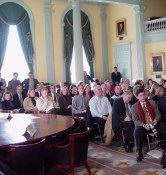 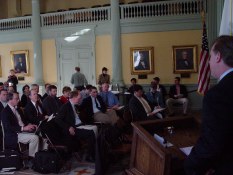 A view of the people sitting in the room
The meeting was moderated by State Senator Jack Hart and Representative Cory Atkins. Also in attendance were the other co-chairs of the committee and caucus, Representative Dan Bosley and Secretary of Economic Development Ranch Kimball, and other legislators as well as many attendees from various constituencies.
  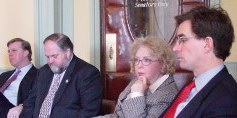  The hosts (Sen Hart, Rep. Atkins, Sen. Hart, Rep. Bosley, Rep. Atkins, Sec'y Kimball) and panelists
 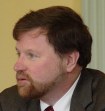     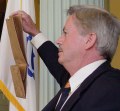  John Palfrey, Bob Sutor, Alan Yates, Alan Cote, Judy Brewer, Linda Hamel, Peter Quinn (showing a birth certificate in a paper bag), and Bob Sproull
Berkman Center's John Palfrey gave an introductory address, and then we heard from the main panel: Bob Sutor of IBM, Bob Sproull of Sun Microsystems, Peter Quinn of MA ITD, Alan Yates of Microsoft, Alan Cote from the Secretary of State's Office, and Judy Brewer from W3C's Web Accessibility Initiative. ITD's Linda Hamel was also asked to speak from the floor. There were then some questions and statements from the audience.
You can find a link to the recording on my blog podcast page, or subscribe to the RSS feed. It's 2 hours and 20 minutes long and takes up a little over 64MB.
Andy Updegrove did a real-time blog of the event. Here is a picture of him doing it:
 MITX Fireside Chat with Jay Walker [link]
Tonight there was another MITX Fireside Chat. This time was a little different. The location was at the MIT Museum, not the Harvard Faculty Club, so no fireplace. The interviewer was Wall Street Journal reporter Bill Bulkeley, not Scott Kirsner (who has moved out of town). What was the same as usual was a great speaker. Tonight's was Jay Walker, Chairman of Walker Digital and best known for his work with Priceline.com.
If you are interested in innovation, business models, the Internet, entrepreneurship, patents, or just general business, you would have loved this meeting. I didn't take any notes...but I did record it for podcasting. It's available now. He talks about patents at about 35:00, and at 54:45, after talking about Open Source, he calls Microsoft the last of the Soviet-style software development places. He's quite outspoken. Listen to the whole thing.
You can find a link to it on my blog podcast page, or subscribe to the RSS feed.
  Jay Walker before the talk, Bill Bulkeley and Jay as he says something to the podcast audience
There were handheld microphones that were used for the PA system. I recorded off of that, but I also put lavalier mikes on the two of them and made a separate recording. I used the PA version for the introduction and my lavs for all of the rest.
Recording of Gartner's Nick Gall at Open Source SIG [link]
As I wrote last week, Gartner Research's Nick Gall spoke at the Mass Technology Leadership Council's Open Source Special Interest Group meeting. This was a preview of slides that were to be presented at Gartner's Open Source Summit today. Now that the time for the "official" presentation is over, I can post the recording.
If you are interested in what a major research/consulting firm has to say about Open Source, listen to this recording. (Hint: They like it and Nick is very knowledgeable about the issues.) Nick makes some specific predictions about the use of Open Source in the enterprise, the size of the market in dollars, where the dollars come from, and more. There was a lot of give and take with the audience (which included lawyers, someone from MySQL, and others) about the GPL, licensing and business models, and more. Attendee Paul Gillin has written some of this up on his blog, also saying that attending the meeting, all of which is available for free download, was "...the best $50 I've spent in a long time." (There was an admission fee.)
 Nick Gall of Gartner
This morning, while listening to the Gillmor Daily where Steve Gillmor and ZDNet's Dan Farber discussed some topics, I had a thought. One of them said something and the other asked a question, giving an example from some specific new product. This reminded me of this recording with Nick. The people asking the questions, with follow up, were very knowledgeable because they are immersed in it in their work. The questions and responses were deep. This is different than listening to a plain speech (no back and forth), and different than a normal reporter who isn't as deeply knowledgeable of the details. There was lots of time to get into questions (Gillmor recordings go on as long as necessary, sometimes an hour, and this meeting had hour-long talks). This is something I really like about podcasting. It lets those that want to the ability to go deeply into something and not be superficial. Questions get asked by people reacting to what they hear who bring more information about related material. Great stuff for people who want to learn.
To listen to Nick, you can find a link to the MP3 on the OSS SIG's wiki page about it. It is also in the podcast series from the SIG which you can subscribe to.
I'm pretty happy with how well this podcast turned out. I did all the audio work myself, as well as led the meeting. The room included a "portable podium" with a microphone and a wireless mike. I plugged my mixer into it and then recorded from that. Not knowing what was going to be in the room, I had also brought my own wireless and wired mikes just in case as well as a wide assortment of cables. I'm recording with an Edirol R-1 digital recorder that can automatically limit the peak volume of stuff that's too loud. (There's a lot of variation as people hold the mikes.)
I've written a Top 10 Sources page on podcasting [link]
The Top 10 Sources web site "officially" launched today, I am told. It's actually been up for a little while, and Dave Winer has been featuring an OPML list from it on Scripting News since November 23rd. Today, though, is the day they are starting with publicity. It's also the day they posted a Top 10 Site I wrote on the home page, so I figured I'd better write something about it here, too. (I expected them to give someone else the honor and have a few days of my list being less obvious so I could get some feedback first.)
The Top 10 Sources web site consists of a directory of subject pages. Each page is created by an individual who is hopefully knowledgeable about the subject. On that page they explain a little about it and link to relevant web pages or sites. In addition, there is a list of 10 particular web sites that they have selected. At the bottom of the page some of the most recent RSS items from those ten selected web sites are automatically listed. It's sort of like looking over the shoulder of an "expert" to see their RSS aggregator output. If you especially like a particular site you have a link there to it so you can find out more and subscribe with your own RSS reader/aggregator. For those who aren't using an RSS reader this is also a painless way to start taking advantage of RSS feeds.
A few months ago John Palfrey, Top 10 Sources founder and publisher (and separately well known for his work as executive director of the Berkman Center for Internet and Society), asked me to do some work for them. More specifically, he wanted me to create a Top 10 Site page related to podcasting and act as a consultant. After finishing some other consulting and getting the wikiCalc alpha release out, I finally had time to start some work a week or two ago.
The first thing was to learn about their system by actually going through the process of creating a Top 10 Site page. That's helping me get my hands around what their site is really about and helps them by getting feedback as I learn, comment, and complain.
The first result is a simple page listing the podcasts I listen to most. Podcasting is too big an area for one Top 10 list, but you have to start somewhere...
For me to feel comfortable with such a list, though, I first wanted to create an introduction for people who don't know what podcasting is so they wouldn't think my narrow choice of 10 was representative of the podcasting world. So, like here on my personal web site where I have blog posts as well as essays, I first wrote a companion page that is an introduction to the podcasting genre, with links to some particular podcasts that I feel help a newcomer get a taste of the breadth of the genre, at least at the time it started to become "hot". The Top 10 Sources people hadn't set up a feature in their content management system for writing such essays, but after a little looking at their pages, the CSS, and other markup I was able to create something that fit in.
I hope you find what I've written for them helpful. It is not meant as a definitive history of podcasting, but it will help you get a feel for its early days.
See "The Genre of Podcasting" and my "Podcasts" page listing my 10 (actually only 9).
Meeting about enterprise adoption of Open Source [link]
Yesterday, the Mass Technology Leadership Council's Open Source Software Special Interest Group held a meeting titled "Open Source and the Enterprise: Enterprise Adoption". It was quite interesting and I was able to record it.
 Attendees
It had two parts. The first was Gartner Research analyst Nick Gall. He gave a full preview of a presentation that will be given at Gartner's Summit next week. It was clear from his talk that Gartner sees a continuing strong adoption of Open Source. His talk is really worth listening to if you care about Open Source, but...at his request I'm holding off posting it until after the for-pay, "official" talk is given because it included all their specific numbers, predictions, etc. Check back late next week. It was real a treat -- there was lots of give and take (it lasted over an hour) with the attendees who really know their stuff on this topic and were not shy to ask detailed questions. Nick is quite knowledgeable (heavy IT background and was an IP litigation attorney) and answered in kind.
The second part of the meeting consisted of two presentations by local, large, IT users. The first was from Blue Cross Blue Shield of Massachusetts. They use a little Open Source. The second, which took up most of the time, was from two people at Fidelity Investments' Center for Applied Technology. They talked about Fidelity's history with Open Source and very specifically how they are getting it under official control with new procedures. That hour-long recording is available now.
If you are in any way connected with enterprise use of Open Source, it is worth listening to this recording. The Fidelity people talk about why they use Open Source, why they like it sometimes more than similar products that are proprietary (it's not because of the lower up front cost), and how they determine what to let in, do training, etc. There were lots of questions from the attendees, many of whom are lawyers and consultants.
   Julie Atkins of BCBS of MA, Mike Askew and Chuck Pickelhaupt of Fidelity
A disclaimer: I was part of Fidelity's internal training last week on this topic, and they say nice things about my training video (at 42:00 into the recording...) which they've purchased.
To listen, you can find a link to the MP3 on the OSS SIG's wiki page about it. It is also in the podcast series from the SIG which you can subscribe to.
End-to-end thinking [link]
An extremely important paper from the early 1980s, that I frequently make reference to, is Saltzer, Reed, and Clark's "End-To-End Arguments In System Design". Often cited as one of the basisses for the design and ultimate scaleability of the Internet, the term "end-to-end" is also often misunderstood. As used in the paper, "end-to-end" means each "end point" (such as the program on a PC) communicating to other end points -- "end point talking to end point". It does not mean "end point and everything along the way including the final end point". The whole point of the paper is that you should minimize the special casing between end points. A "smart" network that "knows" what the end points need is what the paper argues against. The idea is to build simple, general purpose infrastructure that doesn't assume certain specific uses. Companies that brag that they have an "end-to-end solution" when they mean "soup-to-nuts" (or as Bob Frankston likes to say, "womb to tomb") solution are really saying, according to the paper, "We have a brittle, hard to evolve system tuned to what we think we know today".
David Reed, one of the paper's authors, just posted on SATN.org "Epidemiology end-to-end". In this post, David applies the end-to-end argument as part of an analysis of a proposed system for pandemic management that requires tracking passengers sharing flights. This post is very much worth reading and understanding. First, though, read the original End-To-End paper so you understand where David is coming from. (A paper related to the End-To-End one is David Isenberg's "Rise of the Stupid Network".)
The principles in the End-To-End paper are important. Systems like the Internet that embody them have proven to scale well and meet unforeseen needs. Systems that don't often fail to scale well, often don't meet our changing needs, and often get in the way of improvement.
Dan on NerdTV [link]
Robert X. Cringely posted an interview he did with me on the NerdTV website (it's show number 10). It runs a little over an hour. The video is about 95MB but there is also an MP3 audio-only version as well as a transcript. I talk about the old days, learning to program, meeting Bob Frankston, business school, a bit about wikiCalc, Open Source, and more. It was recorded in my living room. Here's Cringely adjusting the camera:
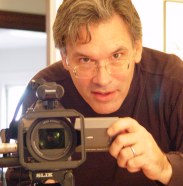 Robert X. Cringely getting ready to record an interview with me on November 10th
Special thanks to Cringely and his team for rescuing this video. Apparently the mike I was wearing failed and they ended up, through hours of work with modern audio software, pulling my voice out of the background of the mike on his shirt.
Shalom Uncle Nissim [link]
It is with great sadness that I note the passing this morning of my uncle, Nissim Albalak, my father's sister's husband. While I did not see him very frequently because he lived in Israel, he was a much beloved member of my extended family and it was always a treat when I could see him. I remember him as a warm, quiet, loving man, always patient and paying careful attention in the background and getting things done quietly and well. When we were around him and something needed to be done we always knew that Nissim took care of it. He was born 80 years ago and lived in Jerusalem in his youth. His family went back something like 9 generations in the city. (Yes, there were Jews living there for many, many years.) He spoke many languages fluently, including English, French, Ladino, Yiddish, Hebrew, Arabic, German, and Italian, having gone to French school, lived under British rule, etc. We will all miss him. May his memory be a blessing.
Uncle Nissim in 2003 and during a visit to the USA in 1953
Dinner with Dan'l Lewin of Microsoft [link]
I was invited to a little dinner tonight, along with John Landry and some others, with the visiting Dan'l Lewin of Microsoft. I managed to salvage a few minutes of podcast to share, mainly discussing Ray Ozzie a bit. Earlier in the dinner we all introduced ourselves and Dan'l answered some questions about Live, but I found out that my new recorder doesn't like being paused long enough to go to sleep or something and lost that section. Sorry. Basically, he sounded like he couldn't say much and/or didn't know the answers and that we'll find out more in the spring (and is probably pretty happy the recording didn't come out...). He didn't seem keen on the idea of OWA-like (Outlook Web Access) versions of Word, Powerpoint, and Excel. Some of us let him know that's what we expected him to say but were surprised because it's what people want. (I had already told him some about wikiCalc.)
The recording is in my Dan Bricklin's Log Podcast series and is about 4 minutes long.
Another software licensing podcast episode [link]
Now that I've released the wikiCalc alpha and have finished with the flurry of Massachusetts and ODF recordings, I've found some time to catch up on my normal podcasting. I have a show that I recorded last month for my Software Licensing series. This one is with attorney Stephen Gold. Steve advises various large company in-house lawyers and we discussed Open Source licensing and how they (and he) deal with it, especially with the GPL. It is an interesting window into the corporate world, and shows why dual licensing can work as a business model today even in cases where it isn't as murky as it is with MySQL. From what I understand of the GPL version 3.0 (which is in development but won't be out for at least many months after much very public discussion) this uncertainty (and some of the certainty) that drives dual license revenue will probably continue even after GPL 3.0 comes out. In fact, GPL 3.0 could make it more common if some factions prevail. More about the GPL 3.0 at a later date. Eben Moglen, who is working on it, has agreed to do a podcast. Once I have time to do proper preparation we'll do it and I'll post it.
To listen to the interview with Steve Gold, see "Stephen Gold, Gordon & Glickson LLC".
I'm working on a new product called wikiCalc [link]
After months of waiting, I'm finally ready to explain my next product. I wanted to wait until I had something you could actually use so there would be a better understanding of what it was and what it wasn't. As you'll see, given the area, people could have all sorts of ideas and I have a pretty specific idea with a few twists. I've just posted an alpha version for download. It's missing lots of features and has had little testing but you'll get the idea and it is useful in its own right (I created the Alpha Test Home Page linked below and related pages with it).
I've been working on this for a few months (more if you include the time before coding began), but have been slowed down by a variety of things (many of them listed in my blog). Finally, I have enough to show so I can now answer people when they ask what I'm up to.
The product is the wikiCalc program -- a web authoring tool that creates web pages. It is for creating and maintaining web pages that include data that is more than just unformatted prose, such as schedules, lists, and tables. It combines some of the ease of authoring and multi-person edit ability of a wiki with the familiar formatting and data organizing metaphor of a spreadsheet. While you edit using a browser-based UI in a spreadsheet, with the A-B-C 1-2-3 grid showing, the final output, like printout from the productivity product, is static and only shows cell borders where you explicitly set them. It handles freeform text in a wiki-like manner and works well with large blocks of text.
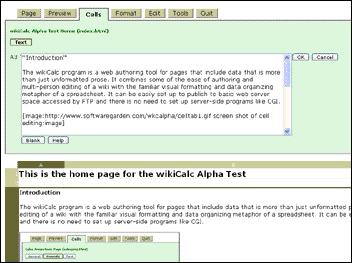 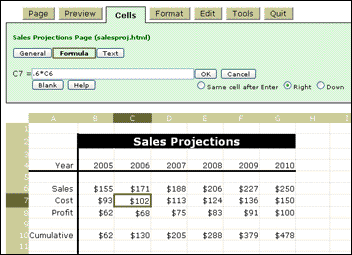 Screen shots of editing
I've posted a short essay here on my blog called "About wikiCalc 0.1" explaining what the program is and why I did it. The program is currently only available as a download for Windows (but will almost certainly be ready for Mac, Linux/Unix, and more at some point soon -- it's written in Perl) and only in the client-side version with publishing to any web server that supports FTP. You can find a link to the download and a bit more information on the "wikiCalc Alpha Test Home Page".
It's great to be out in the open and able to talk and write about what I'm doing. I'm looking forward to hearing comments and other feedback.
|
||
|
© Copyright 1999-2018 by Daniel Bricklin
All Rights Reserved.
See disclaimer on home page.
|
||

